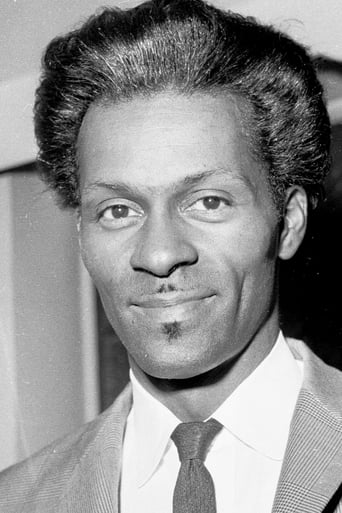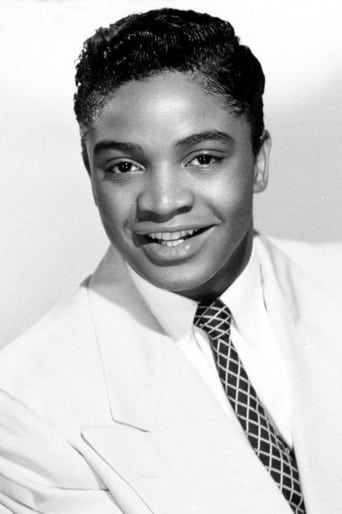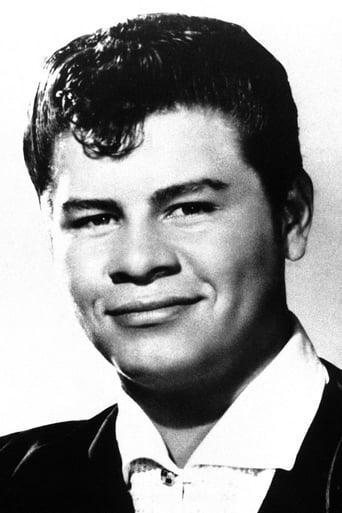Afouotos
Although it has its amusing moments, in eneral the plot does not convince.
AshUnow
This is a small, humorous movie in some ways, but it has a huge heart. What a nice experience.
Sienna-Rose Mclaughlin
The movie really just wants to entertain people.
Jenni Devyn
Worth seeing just to witness how winsome it is.
GManfred
I lived through this era but I didn't see this one the first time around. Now I know why. Word probably got out that the songs were obscure and not the songs these performers were known for. The problem is compounded by a very lame plot which was meant as a filler in between songs, and you have a movie you can easily pass on.Several big 50's names are here, but as I mentioned no famous songs. The story centers around singer Jimmy Clanton and Alan Freed, a 50's disc jockey unknown to audiences nowadays. Clanton is trying to break into show business and Freed is sponsoring a contest for an unknown singer on his show - you can almost write the script yourself from this point. The sole bright spot is a youthful-looking Chuck Berry, who does his patented duck walk while playing his guitar, and sings "Johnny Be Good" and "Memphis", which was made popular a few years later by Johnny Rivers. Berry is the only reason for my rating, which is too high without him.
bkoganbing
For the folks my age who are into the nostalgic era of the first days of rock and roll Go Johnny Go. All the acts involved in this film got to do their stuff with hardly a plot to get in the way.What plot there is involves Alan Freed doing a very good job of playing himself, disc jockey king of rock and roll. Freed puts himself out on a limb saying he will find a singer he will rename and manage. The name Freed picks out for his ersatz Elvis is Johnny Melody. This plot so reminded me of that classic Brady Bunch episode where Greg Brady is picked to be the new Johnny Bravo. Here though it's not just because Jimmy Clanton is the right fit for his stage costume.Enter young Mr. Clanton who gets fired in his job as a theater usher for getting into the rock and roll jamboree show a little too much. It was on that night that he hears Alan Freed's boast to find a new singing star to be renamed Johnny Melody. In fact Freed is having some trouble making this idea from press agent Herb Vigran turn into reality.Chuck Berry besides Clanton and Sandy Stewart is the only performer to have more than just a song in the film. He plays Freed's alter ego and very smoothly I might add. His is the best acted role in the film.And of course Go Johnny Go has the appearance of a pair of soon to be legends. Ritchie Valens never saw his spot in this film, dying in that famous plane crash four months before this film was released. Eddie Cochran died a year after that in a car crash. The music is fine although personally my taste goes back a decade or two in popular music. There's one person I know that loves this sort of stuff, he lives for the nostalgia concerts featuring the performances of the artists of this era. So to my former work colleague Myron Eskenazi this film and its review is dedicated to you.
Woodyanders
Legendary 50's rock disc jockey Alan Freed's last and best movie with Freed not only starring (he gives perhaps his most comfortable and engaging performance here), but also producing as well. Freed plays wise, kindly, worldly mentor to an eager beaver orphan (and failed choirboy!) who needs Freed's endorsement to make it as a big-time rock star. Granted, the trite rags-to-riches central story ain't much; ditto the nondescript direction, drab, static cinematography, flat TV movieish production values, and very basic editing. However, one doesn't evaluate this type of golden age of rock feature on either its technical finesse or narrative expertise; it's simply how smokin' the music is that's the chief concern. Fortunately, said music really cooks. Chuck Berry exudes his customary suave confidence belting out the stone cold aces classics "Johnny Be Goode" and "Memphis, Tennesse." Adorable Jo-Ann Campbell happily chirps the saucy "Mama Can I Go Out." The Flamingoes bring down the house with the raucous party platter "Jump, Children." Harvey pleasantly croons the catchy, charming "Don't Be Afraid of Love." The Cadillacs goof it up something silly on the funny Coasters-style novelty numbers "Jay Walker" and "Please Mr. Johnson." Rockabilly giant Eddie Cochran does a killer rendition of the stupendously boss "You Better Know It." Richie Valens moans outrageously through the socking "Ooh My Head." Lead actor/singer Jimmy Clanton, an affably boyish Louisiana-born lad with a strong bluesy rasp of a voice, commendably holds his own amid this fantastic wealth of remarkable musical talent: the snazzy "Ship On a Stormy Sea," the dreamy "Don't You Know," the lovely "Angel Face," and the pretty, swoony ballad "Once Again" are all first-rate tunes. And the flick's disarmingly effervescent evocation of the nifty 50's rock milieu definitely hits the sweetly nostalgic spot: the kids are decent and clean-cut, the adults tolerant and understanding, the songs all possess cheery, upbeat messages, there's nary a trace of irony or cynicism to be found throughout, and even notoriously jerky skinflint Chuck Berry almost succeeds in coming across like a nice guy (!).
Charles M. LaBow
Go, Johnny, Go! Was the only film in which Richie Valens (Richard Steven Valenzuela) appears on screen. This is significant. 17 year old Valens was killed only a few months after filming, in the plane crash with The Big Bopper (Jiles Perry Richardson) and Buddy Holly, on February 3, 1959.Go, Johnny, Go! wasn't released until the spring of 1959.The crash itself, also has some unusual circumstances attached to it. The plane had been chartered by Buddy Holly so that he could join his band at the next stop, Fargo, North Dakota. Valens, Holly, "Jape" as the Big Bopper preferred to be called, and Dion and the Belmonts had been traveling on a bus throughout the Midwest on the "Winter Dance Party, 1959" tour. The bus had been having engine problems and the interior heating system was not working. As a result, "Jape" was coming down with the flu and asked Buddy Holly if he could have Holly's bass player's seat on the plane. The bass player for Holly at that time, was Waylon Jennings. Jennings gave up his seat and the Big Bopper, Ritchie Valens, and Buddy Holly took off at 1:00 AM in the morning from Clear Lake, Iowa and entered rock and roll history only eight miles from the airport.At the time of the crash, Ritchie Valans's singles, "La Bomba" and "Donna" made him the most popular artist on the bill.





